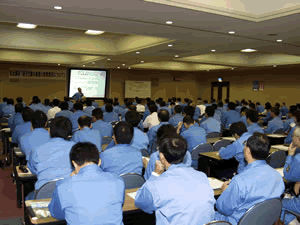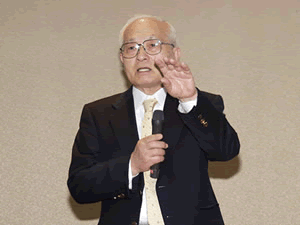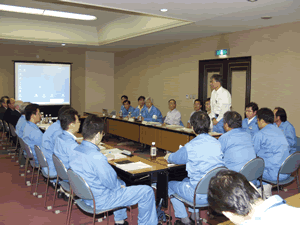|
|
 |
| |
The 87 th Safety Caravan was held at the Misubishi Heavy Industry Takasago Machinery Works in Takasago City , Hyogo Prefecture on October 5, 2006. |
| Safety Presentation
|

|
|
During the safety presentation
|
One hundred fifty one (151) employees of the Mitsubishi Heavy Industries Takasago Machinery Works attended the Safety Presentation.
Mr. Atsushi Maekawa, Plant Manager of Mitsubishi Heavy Industries Takasago Machinery Works led off the presentation with the following salutation.
"We are pleased to have JANTI here to conduct the 87 th Safety Caravan. We have been looking forward to this day.
"After today's introduction of JANTI's campaign activities, Professor Sugimoto will lecture us on ethics and accountability in the nuclear power industry, an issue that faces all of us and a theme of utmost importance, and he will teach us about problems that are unavoidable in our work in the field of nuclear power.
"As many of you may already know, in around the middle of September the Nikkei Shimbun (Newspaper) ran an editorial about shoring up the footing of nuclear energy. The editorial pointed out three bad examples. The three examples being the accident at the Mihama plant of Mitsubishi Heavy Industries, or the pipe labeling incident, the second was the falsification of Toshiba flowmeter test data, and the third was Hitachi Ltd.'s Hamaoka turbine damage. The Nikkei Shimbun suggested to manufacturers that the foundation on which the nuclear power industry stands may be crumbling. I felt that the fact that this issue was taken up by the Nikkei Shimbun signals a crisis for those of us manufacturers who support the nuclear power industry. As the nuclear power industry is seen by our customers and the general public, it is not only a matter of improving products, but especially I believe it is more of a matter of the demand on organizations, Takasago Machinery Works being one such organization, to turn out products that are truly safe for nuclear power plants. Moreover, that requires assuming the responsibility of giving clear explanations, in other words, accountability. I believe this is a task for all of us. The times are definitely changing. It is not only a matter of just having good products, but going one step further, what is demanded is for the organization to have a solid basis for manufacturing products, and whether it is an organization with accountability and gives detailed explanations. As a business enterprise, our basic stance as we conduct our business is to have sincerity and transparency, we must be straightforward and have the integrity that is expected of us as members of society, and this, I believe, is the entire base. Altering data with the intention of doing what is perceived to be for the benefit of the company must be eradicated, for if not eradicated, the company cannot survive. We are thinking to export new nuclear reactors to the US and China, and I believe it is required for each one of us to live our lives within the company, as well as our personal lives, based on honesty and integrity.
"Today, we have the opportunity to learn from this precious lecture, and I believe we are all earnestly looking forward to building up the reputation of Takasago Machinery Works in the future."
After the salutation, JANTI introduced the current state of activities, followed by Mr. Taiji Sugimoto, representative of NPO Engineering Ethics Forum, Inc. who delivered a lecture entitled "Ethics and Accountability in the Nuclear Power Industry."
|
Lecture highlights |

|
|
Mr.Sugimoto
|
1. Ethics of those involved in engineering
(1) Why ethics?
A system known as Professional Engineer (PE) came into being in the US in the first half of the 20th century. In due time, it became clear that putting the "public first" had become the ethics of engineers. In view of the trends toward ensuring safety, we can see the significance of this. Engineers are entrusted by society to the task of applying technology to the daily lives of the people, and as a condition for this, they bear the responsibility to conform to (be in compliance with) the social model (laws and ethics).
(2) The Public
In this age of technological progress and mass-production and mass-consumption, as we speak, even though consumers do not understand technology very well, they are exposed to the risks of being harmed by it. It is those such people we refer to when we speak about the Public.
2. Ethics, safety culture, and accountability in the nuclear power industry
Consider, in chronological order, the Monju sodium leak accident (1995), the falsification of spent fuel transport containers data trouble (1998), JCO criticality accident (1999), TEPCO cover-up of problems (2002), and the pipe rupture accident at KEPCO's Mihama plant (2004). By examining the investigative reports issued by administrative agencies and those of the Nuclear Safety Commission, the logic and the problematic issues concerning the way of thinking can be seen.
3. The individual within an organization
Let us compare the JNR Nagoya Blue Train collision (1982) with the JR Amagasaki derailment accident (2005). Despite their labor-management differences, they have something in common. Generally speaking, the organization is involved in the fruits of technology, and when accidents and calamities occur, the awareness of individual persons within the organization is ultimately involved.
4. Hindrances to ethics-orientation
Although ethics are applied within every organization, they do not function in the same way throughout. In order for ethics to function, certain conditions apply. If there were hindrances to ethics-orientation within the nuclear power industry, hypothetically they would be.
• the accumulation of database-type knowledge
2- the incomplete discernment between the general public and the nuclear power opposition faction
3- climate of defensiveness, introversion, isolationism
5. What are ethics?
(1) Morals and ethics
Engineers normally make the distinction between what is permissible and what is not, and possess the sense of acting accordingly (this is what is meant by "morals"). So how does it come about that ethics turn into an empty shell?
(2) Community and climate
Every person, in addition to being a member of society, also belongs to some number of communities. A business enterprise is one such community where management and employees band together under a common goal and there is a relation where interaction becomes possible and there is mutual (to some extent) trust (to some extent). The interaction in such a community, or so-called "openness," gives rise to the sharing of information. The climate of the community exerts a great influence on consciousness and actions of the individual. If endeavors to promote ethics are made here, ethics will function.
6. Seeking a means of ethics
Having a method of establishing ethics within a community is a desirable thing. There is no shortage of examples of managers with positive attitude having succeeded in establishing ethics within the company, but the system is not transplantable. What is suitable to students is not necessarily suitable for a corporation. It is not a matter of putting things in order through lectures and seminars, it requires self-help efforts.
1- effectiveness of reading materials
2- consciousness of endeavors in group case studies
7 Conclusion
The above valuable advice was brought out in the lecture. |
In the questionnaire after the presentation, the following opinions were expressed.
•I was particularly interested in the history of quality control, and its introduction into postwar Japan and such topics. PE qualifications have been dependant upon the ethics model since their inception. The differences in culture between the USA and Japan are quite interesting. In the USA , it is the rule that PE is the individual's responsibility, but in Japan this is replaced with Safety Culture in which the organization takes the lead, whereas the responsibility for ethics of the individual are forgotten. Rules, and labor management, regardless of how strict they are, can not bring up sound corporate activities unless there is respect for other people. The explanation was very easy to understand.
•Upon hearing about the sense of ethics that should be possessed by engineers, it refreshed my awareness of my own situation. I hope to have a continued awareness in order to improve ethics. It is exceedingly important. I hope to make efforts to maintain the trust of the public.
•Today's lecture was very useful in that it reinforced my own ordinary thinking, but even more significant, and this is not limited to nuclear power, it was also a good lecture in that it caused me to think a little more about day to day safety. To sum it all up, we must not forget that after all safety depends on the awareness of individuals. I understand safety culture, but first of all, it is a must for each individual to thoroughly understand ethics. And in that context, I believe it is important to discuss ethics at the stage of school education. In every corporate culture there is a great deal of talk about education, and there are opportunities to attend lectures such as this one, but that is not so in the case of every individual. I believe that the reason why automobile accidents continue to occur is because the sense of ethics held by individuals is disappearing.
|
Safety information exchange session |

|
|
During the Safety information exchange session
|
(1)
Introduction of endeavors and exchange of opinions
Mr. Takehiko Minami, Manager of the Nuclear Power Manufacturing Division at the Hitachi Works, Electric Power Group, Hitachi Ltd. honored the safety information exchange session with his presence and presented a detailed introduction of "Introduction of Good Practices by the Safety Caravan: Endeavors by Hitachi Nuclear Power in Manufacturing Activities" (putting safety first in every aspect).
Also, Mr. Akihiro Sagou of the Engineering Division,Takasago Machinery Works, Mitsubishi Heavy Industries gave a presentation on "Engineering Subcommittee: Nuclear Safety Quality Improvement Project" and Mr. Masanori Tsuge, Education Promotion Section, General Affairs Division at Takasago Machinery Works, Mitsubishi Heavy Industries gave a presentation on "Enhancing Techniques, Technical Skills Training, and Leadership at Takasago Works." After the presentations, information and opinions were exchanged regarding the above-mentioned activities and endeavors.
(2) Other
JANTI's NS Net Division introduced its nuclear power safety culture fomenting database and the like.
|
|
|







